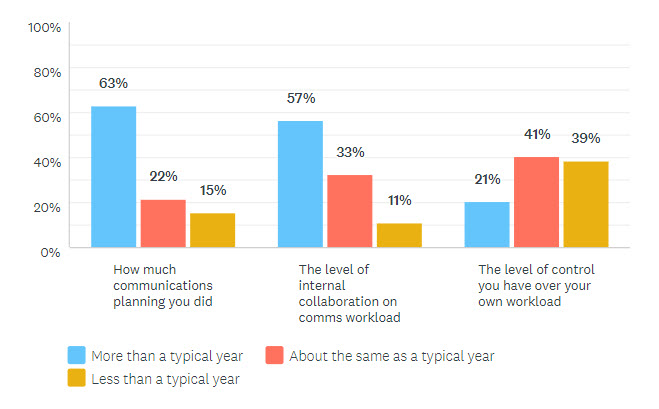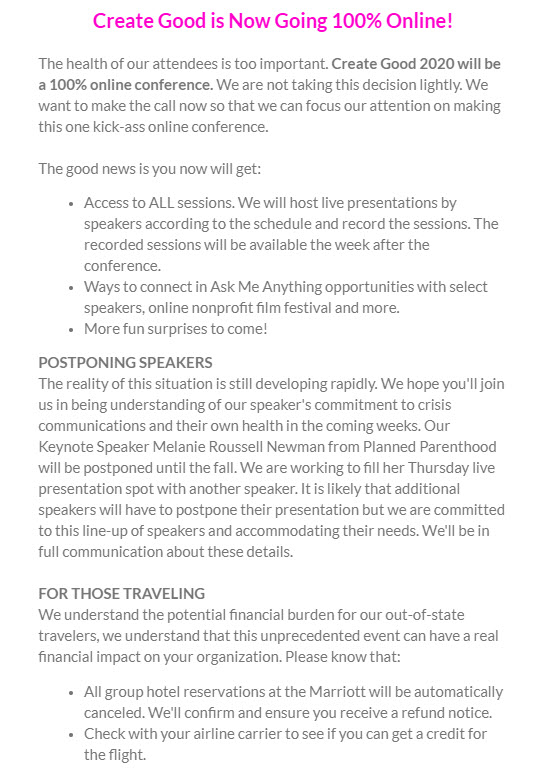Last week, I shared a post highlighting how the organizers of two nonprofit conferences — NTC and Create Good — were messaging attendees regarding their decision-making in the wake of the coronavirus epidemic (now pandemic).
Last night, both event organizers canceled the conferences (Create Good will be online).
Today, I want to do a couple of things with this post. First I want to share that cancellation messaging with you as examples of what you can do, as I did with the earlier post.
Then I want to reflect a bit more broadly on what I’ve seen as weaknesses in nonprofit event messaging.
Communicating the Cancellations
Here’s a portion of the NTEN email, which is also available on the website and Facebook. NTEN was clear in their earlier messaging that they had no intention of trying to put any of the event online (more on my feelings about that below). I love that Amy Sample Ward has been doing videos along with the text and that they are immediately cross-posting via email, web, and social media.
I also appreciate that they are being very candid about the financial implications (in this last message anyway). Almost 2/3rds of the organization’s budget is raised at the conference and this is obviously a consideration for all nonprofits doing event fundraising. I would encourage all of you to be transparent about this throughout your messaging — it’s not like it’s some big dirty secret that nonprofits do event fundraising.

With Create Good, organizer Dawn Crawford sent out an email last night to speakers first, asking who would be available for the online version of the event as they had planned for that (Create Good is about a tenth the size of NTC for what it’s worth).
Then this morning, she shared this email with attendees.

What to Consider Doing Differently
Let me say at the start that my advice below is based on 20-20 hindsight. I do not envy the positions that these event organizers are in. I fully support both the organizations, their staff and leadership, and events themselves: NTC and Create Good are the two conferences I tell communications directors to attend, and that won’t change. We paid for two full registrations to NTC and we have donated one of them to NTEN, effectively making a $649 donation.
But just as we encourage you to copy what others are doing right, we also believe in identifying ways to improve upon what others are doing. I offer the following suggestions and criticisms in that spirit. It’s also important to note that this advice isn’t based solely on what I saw from these two conferences alone, but what I’m seeing elsewhere online too.
Don’t Use Peer Pressure Against Your Attendees
People don’t want to be perceived as being weak or cowardly, especially in a professional context. In the conversations that I saw and participated in myself in the last week or two, very few people were publicly saying that they weren’t planning to attend because of the virus. But many of these conversations were happening in private.
Instead, we saw a lot of people publicly saying they still planned to go, and in the case of NTEN’s response, this was a primary part of the messaging: Very few people are canceling, so we are going forward. This is classic “everyone’s doing it / we are normal and you are not if you are canceling” peer pressure.

Last week, at the time of this messaging, I was one of those people struggling privately with my decision because I was surrounded by friends and colleagues who said they were going. I felt like I was being weak and cowardly when I am normally much more of a risk-taker. Whether intentional or not, NTEN’s messaging and rationalization for not canceling at that time reinforced that feeling in me. It made me second-guess myself and seriously heightened my FOMO anxiety.
I delayed sharing my decision not to attend, even though I knew that was the responsible choice for me and my family, not to mention the community at large. I finally shared in our email newsletter Wednesday afternoon that I was likely not going — but even then I lacked the fortitude to say so definitively. I left the door open because that bit of peer pressure was still there. I received many responses to the newsletter, confirming I was not alone.
Naturally, after NTEN announced they were canceling last night, we started to see the relief come flooding out publicly. People are admitting that they had decided not to attend days or even weeks ago, even if they hadn’t said that publicly. No doubt, many of them didn’t want to feel like I did either.
The lesson here is to simply be aware that in your desire to rally people in staying with you, you may effectively be both dismissing and silencing other people. In retrospect, had I been more self-aware last week, I may have suggested that NTEN reconsider this “everyone’s still going / it’s a normal year / if you don’t come, that’s fine, but that’s on you” angle in their messaging. It’s really irrelevant to the decision at hand when dealing with public health issues.
Consider the Equity and Inclusion Implications of Your Messaging and Decisions
This was not explicitly included in the conference messaging I saw, but it was definitely part of the larger cultural narrative: Coronavirus is only affecting the old and/or already sick and we really don’t have to worry about those people at an event for professionals. They don’t really matter to the overall success of our event.
But when you break this down, we are not talking exclusively about the nursing home and senior living set.
Depending on where you look, “older adult” is either defined as people over 50 or over 60. According to the US Bureau of Labor Statistics, workers 55 and older make up 25% of the labor force, and this number is GROWING in percentage because people are delaying retirement. That is a pretty big group of people to write off as irrelevant in your decisionmaking.
The same goes for “the sick.” We aren’t just talking about people with terminal illnesses or highly compromised immune systems like people with organ transplants. This includes people with any form of heart or lung disease, regardless of their age, and diseases as common as diabetes. Did you realize that about 10% of the US adult population has diabetes? There’s also some evidence that coronavirus is especially dangerous for smokers. About 14% of Americans smoke.
Anyone using the “it only affects the old and sick” rationale to move forward with events — especially if those decision-makers are in their 20-40s and in good health — needs to take a good hard look at that form of privilege in their decision making. Make sure you really understand and own up to the implications for the true numbers of people you are likely affecting and leaving out.
Come up with a Plan B, Even if It’s Not Fabulous
Finally, I’m a bit taken aback that NTEN isn’t offering some kind of online alternative. It’s a huge event, so I completely understand that they can’t put the whole thing online. But it seems doable to offer some sort of scaled-down version online over the next several weeks. Or to encourage panelists to host their own webinars and serve as a clearinghouse for those in some way.
So many nonprofits are looking at ways to take their in-person events online in the wake of this pandemic, and NTEN would appear to be the perfect organization to advise people on how to do that. I know they have not been thrilled with some of their online conference experiences in the past, and no one is pretending that it is a full substitute for the in-person experience. But it just seems really off-brand and not community-oriented for the leading tech nonprofit to rule out a digital solution, even if it’s not ideal. Of course, that does come with additional expenses, and NTEN is already being very transparent about the revenue losses they will suffer by canceling.
Remember to Take Care of Each Other
Obviously, this is super hard stuff. But that’s what nonprofits do — the hard stuff that governments, businesses and individuals can’t or won’t do themselves (this is my personal definition for what a nonprofit is, by the way).
We have to learn together, lead together, and take care of each other.
I like the sentiment that Beth Kanter has been sharing:
“We need to approach this with compassion, not fear. Compassion for ourselves, family, community, professional community, and especially the people who are vulnerable. We have to do social distancing to stop the spread, but it does not mean turning our backs on people like hourly workers who do not have health care or sick pay. We have to accept our new normal. From the nonprofit professional perspective, we have to help each other out. I think about our dear friend John Haydon and how he always helped people out and we have to all be like John Haydon.”
If you need more to read about this, especially related to the rationale for canceling events sooner than later, check out these resources (also shared by Beth):
Cancel Everything — Article in The Atlantic about the need for immediate social distancing
FlattentheCurve.com — Information on how to get through this without completely overwhelming our healthcare system
StaytheFuckHome.com — a citizen movement to stop the pandemic





